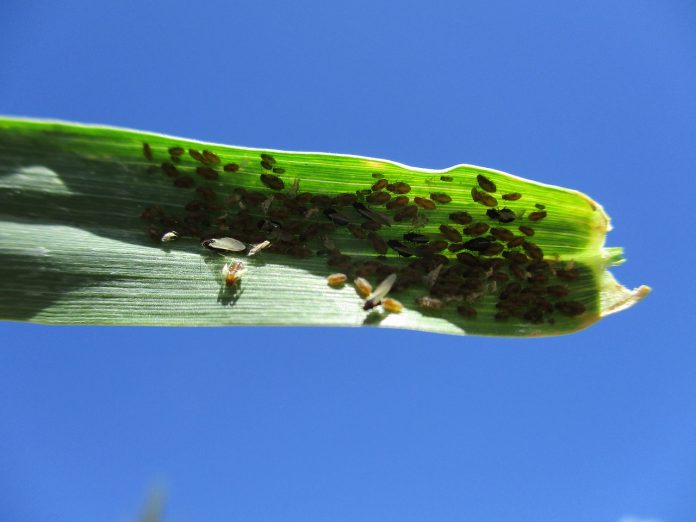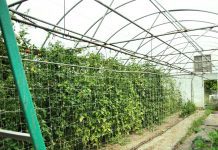
Aphids are often found on indoor plants and affect their growth. Find out how to kill aphids so your houseplants can be healthy.
Aphids are a common insect found on both indoor and outdoor plants. You will know them because they cluster around new plant growth and release a sticky substance that will eventually become black from the mold. This tiny insect can be a menace to deal with. However, if you know how to kill aphids and get rid of them, you can nip this problem in the bud before it gets out of hand.
We are going to go over the best ways to kill aphids. When it comes to protecting your plants, the more natural the treatment, the better. This is the reason why we will be focusing on more natural ways to kill aphids, which are non-toxic to your precious plants.
- The Best Ways to Kill Aphids
Aphids like to congregate on the undersides of leaves because that is where plants store their sap. A small amount of aphids is no cause for alarm, but the population could quickly swell if you take no action. Once there is a massive population of aphids, your plants will start to turn yellow and wilt.
Aphids also carry toxins and diseases with them. When they munch on the leaves of your precious plants, they can be introducing toxins and contagions to them, which will harm them. When aphids are around, they can be the start of more problems if you do not take direct action right away.
Your first reaction may be to clip the affected leaves and hope that no more aphids come back to feast on your plants. However, you do not have to resort to taking leaves or limbs off of your plants. There are many effective options available that do not require those kinds of sacrifices.
There are multiple ways to kill aphids. Some of them rely on the introduction of other insects, whereas others require you to use specific oils and powders. If one method does not seem to be doing an adequate job, move onto the next one. You will exterminate these pests soon enough, so do not give up!
- Introduce Natural Predators
There are a few natural enemies of aphids. These other insects will do the dirty work for you if you do not want to go on an insect-killing spree. By introducing natural predators to your plants, or nearby, you will be able to support the expansion of insects which are helpful to you and others. The best natural enemies of aphids to introduce to your plants and garden are the following:
- Ladybugs – These beautiful and beloved insects love preying on aphids. They are the best natural predators you can find to get rid of an aphid infestation. Place a few near, or on, your plants and let them get to eating.
- Lacewings – These lesser-known insect predators have translucent wings and a green body. They possess quite the appetite, having the ability to eat as many as 60 aphid eggs an hour! Get them in front of a bunch of aphids, and you will find yourself free of aphids quick.
These natural foes of aphids work best at killing off those unwanted pests when there is a low or medium amount of aphids on your plants. If you have a more massive infestation of aphids, you are going to need something a little more intimidating.
- Sprinkle Diatomaceous Earth on Them
To get long-lasting protection from aphids, get some food-grade diatomaceous earth and sprinkle it onto the areas of your plants where aphids are congregating. This is a solution that will kill an aphid population no matter how large it is.
This fine white powder is made up of ancient fossilized organisms called diatoms, originating in oceans. Although you would have to look through a microscope to see them, they look like jagged pieces of glass. They will instantly cut through the bodies of the aphids once they come into contact with it.
- Beauveria Bassiana Fungus
The Beauveria Bassiana fungus is a natural insecticide. As a form of an entomopathogenic fungus, it loves to eat aphids. While this fungus will kill any aphids hanging around your plants, it will also kill plenty of other pests. Beauveria Bassiana works so well that it rivals even strong synthetic insecticides. You can find this fungus in several products targeting pests like aphids.
- Insecticidal Soap
You can effectively kill off an aphid uprising by either buying or making your own insecticidal soap. This type of solution only kills aphids while leaving your plants unharmed. The way it works is by interfering with an aphid’s cell membranes. The soap must make direct contact with an aphid to kill it.
You can easily create an insecticidal soap using these ingredients:
- A cup of vegetable oil (corn, safflower, peanut, and soybean oil all work well)
- A tablespoon of mild and liquid dishwashing soap (make sure it is not concentrated)
Place these liquids into a jar, shake them up, and keep this as your concentrated insecticide. To start using it, get a spray bottle and fill it with a cup of water. Add a teaspoon or two of your concentrated soap into the bottle, shake it all up, and start spraying the soap on your aphid-infected plants. Spray any surfaces of your plants to make sure you leave no area untouched.
- Neem Oil
If you want to know how to kill aphids in a completely natural and organic way, neem oil is what you should use. Neem oil comes from the tree seed of the Indian Neem and acts as a pesticide and controls the aphid population well.
It also helps control the ant population, which is an important function when it comes to aphids. Ants love the honeydew that aphids produce, and they will defend aphids at all costs. When you apply neem oil to the stems of your plants, it will either deter them or kill them. Neem oil kills pests on contact and keeps away the friends of aphids. This is a unique way of taking care of two issues at once.
- Horticultural Oil
If you want to take a more industrial-strength route to kill aphids, you can go to a nursery or the garden section of a home improvement center and get horticultural oil. While this is a less natural method of killing aphids, it will get the job done. This solution works exceptionally well for a situation where aphids stick around through winter and then cause an infestation in the spring.
You will want to wear protective clothing to avoid getting any of this oil on your skin. All you need is two to four tablespoons of the oil, which you would then mix into a gallon of water. The best time to spray this solution on your plants is before their new leaves come out in the spring. Target the stems and branches when applying horticultural oil.
- Essential Oil Spray
If you want to know how to kill aphids while making your house smell good, you will want to make an essential oil spray. There are a few essential oils which will either kill aphids or make them escape, never to return as long as the scent of those oils in on your plants. The best essential oils for this method are:
- Rosemary
- Cedar
- Clove
- Peppermint
To make an effective spray, add four or five drops of one of these essential oils (or several if you make a blend) to a spray bottle containing water. Spray the solution on every part of your infected plants.
These oils will only harm the aphids while leaving your plants free of any damage. Your plants will only get hurt if you do not dilute the essential oils enough in the water you will be using. Make sure you use the same bottle for whenever you want to spray your plants.
- Avoid Over-Watering and Over-Fertilizing
Aphids have certain preferences. They enjoy environments with high levels of nitrogen, as well as soft and new plant growth. You can easily avoid these aphid homing beacons by merely watering your plants less and giving them less fertilizer. Organic fertilizers with lower nitrogen content are an excellent way to avoid making your plants appealing for aphids in the first place.
- Wrapping Up
You now know some of the best methods when it comes to killing aphids. Learning how to kill aphids will protect and save your plants from succumbing to this common menace. There are plenty of natural methods you can use instead of taking a chance with synthetic insecticides harboring toxic chemicals.
If you do not have an aphid problem right now, then take some preventative measures we provided to avoid having an issue in the future. If you currently are dealing with aphids attacking your plants, take advantage of the powerful and natural methods we provided and kill all those aphids right away. Your plants will stay lush and green as long as you make sure to follow this guide.



